
Identical twins are a miracle all by themselves. Births like this happen three or four times in 1000.
Savannah Combs, a first time mother, learned she was carrying twins. She and her husband were overjoyed by the thought of welcoming two babies.
Everything went well with the pregnancy and the couple learned they were expecting girls. However, they also learned that their identical twins both had Down Syndrome. The news came as a shock at first, but Savannah, 23, soon realized that the condition only meant that her girls would be super special. She didn’t mind they would be born with the syndrome. Of course, she was aware that there would be people who wouldn’t accept her bundles of joy, but that didn’t concern her a great deal.
“It’s very rare what they have, but they’ve been my little gems,” the proud mother told News4JAX.
Once the girls were born, Savannah and her husband Justin decided to share their journey on TikTok. The two tiny beauties, Kennadi Rue and Mckenli gained a number of followers on the social media where Savannah posted about each of the milestones they reached.
In one of the videos she shared on TikTok, Savannah revealed how doctors advised her to terminate her pregnancy because the chances of her girls to survive were slim, but she decided to give them a fighting chance. As it turned out, she did the right thing. ”Every [prenatal] appointment they were alive was a blessing to me,” Savannah explained.
They were born five weeks prematurely and had to spend some time at the NICU. Today, they are nine months old and thriving. In fact, they are just like any other baby out there.
“They’re called mono di twins, meaning that they had their own sacs, but they shared the same placenta, meaning that they were going to be identical,” Savannah explained.
“Mo di twins as it is, it’s like very rare. And then you throw Down syndrome on top of it, it’s like one in 2 million.”
“They have feelings. They have a beating heart. They know how to talk. They know how to do things you do. They will get there,” she added. “Like I said, it may be a step behind but they’re going to do it. I’ve learned these kids are feisty little things and happy little things.”
She loves showing the world that having Down Syndrome doesn’t necessarily mean the life of those people is in any way affected negatively.
“I’m going to let them know that they’re just like us and they’re going to get there as long as they put their minds to it.”
Of course, there are always those who post negative comments and judge Savannah for keeping her babies.
”I wouldn’t want those babies; if mine came out like that, they would be straight up for adoption,” one person wrote under one of the videos. However, this mother had just the right answer for the mean person. “I said, good thing they weren’t born to you and were born to me. God knew what he was doing by giving these babies to the right parents who would love them regardless,” Savannah replied.
These girls are truly happy for having a mom like Savannah who wants to raise awareness about Down Syndrome and teach the world that those who have it can lead a happy and fulfilling lives, just like her two beautiful angels.
For more on this family’s beautiful life story go to the video below.

My Twin Sons Stopped Talking After My MIL Spent the Weekend with Us – One Night, I Finally Heard Them Speak and Was Taken Aback

When my twins stopped talking after a visit from their grandmother, I thought it was just a phase. Therapists, doctors—nothing worked. Then, late one night, I overheard them speaking in hushed tones, their words unraveling a secret that shattered everything I thought I knew about my family.
It started with the whispers. Faint, and unclear murmurs coming from Jack and Will’s room. At first, I thought I was dreaming—after all, my twin boys hadn’t uttered a single word in months. But the moment I leaned against their door and heard Jack’s voice, clear and trembling, I froze.

Woman eavesdropping | Source: Midjourney
“I can’t stay silent anymore. This will kill Mom when she finds out.”
Kill me? Find out what? My heart pounded as I strained to hear Will’s reply.
“But you heard Grandma,” he said. “Dad is handling it. And Vivian is waiting for us.”
Vivian? Who’s Vivian? And what on earth did Grandma say?
I didn’t storm in right away—not yet. I felt my legs weaken, every part of me screaming to fling the door open, to hold my boys, to demand answers. But something about the way they spoke, the weight of their words, stopped me cold.
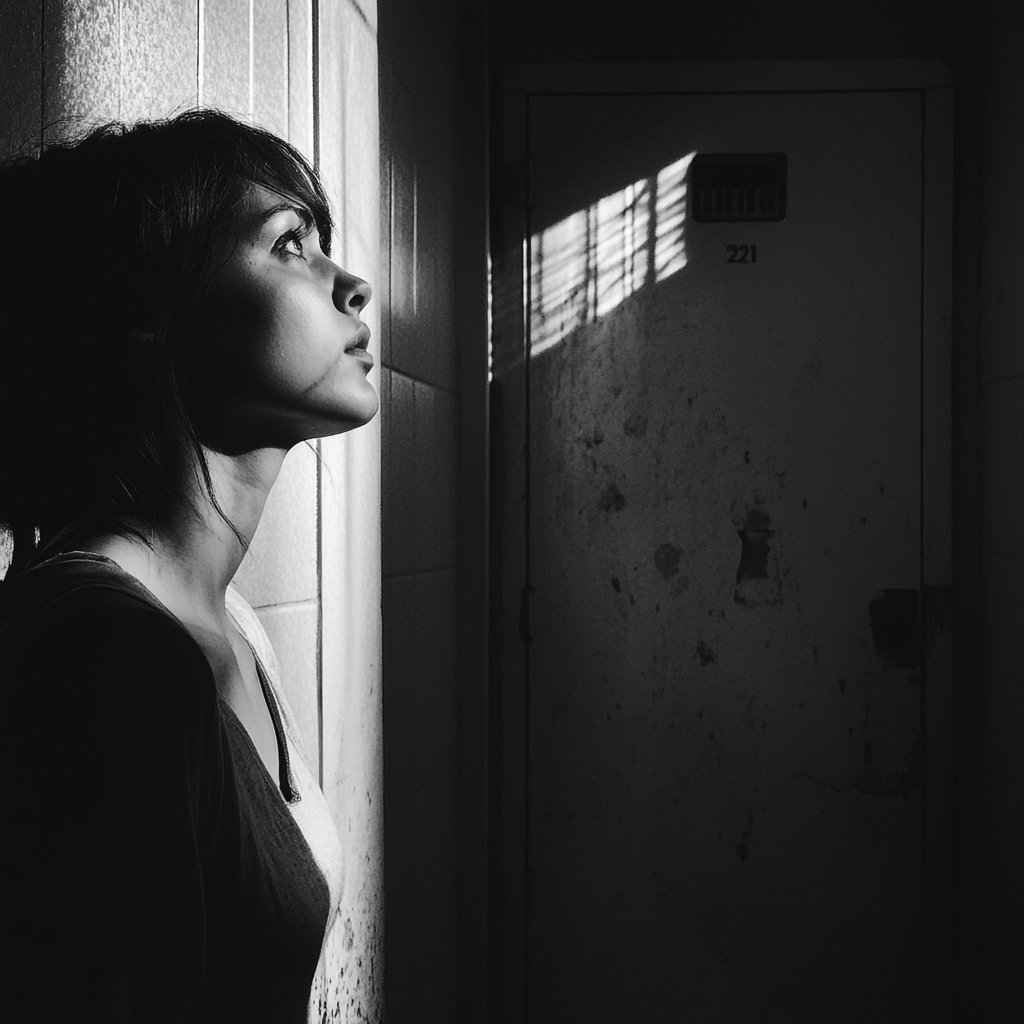
Woman in deep thoughts | Source: Midjourney
To understand how we got here, you need to know this: my mother-in-law, Patricia, visited us exactly twice in ten years. The first time was right after Jack and Will were born.
The second time? Three months ago.
The boys adored her at first. They called her “Gram,” hung on her every word, and begged her to stay longer. And she did. But by the time she left, everything had changed. Patricia took them aside for one “private little chat,” and they haven’t spoken since—not to me, not to their dad, not even to each other.
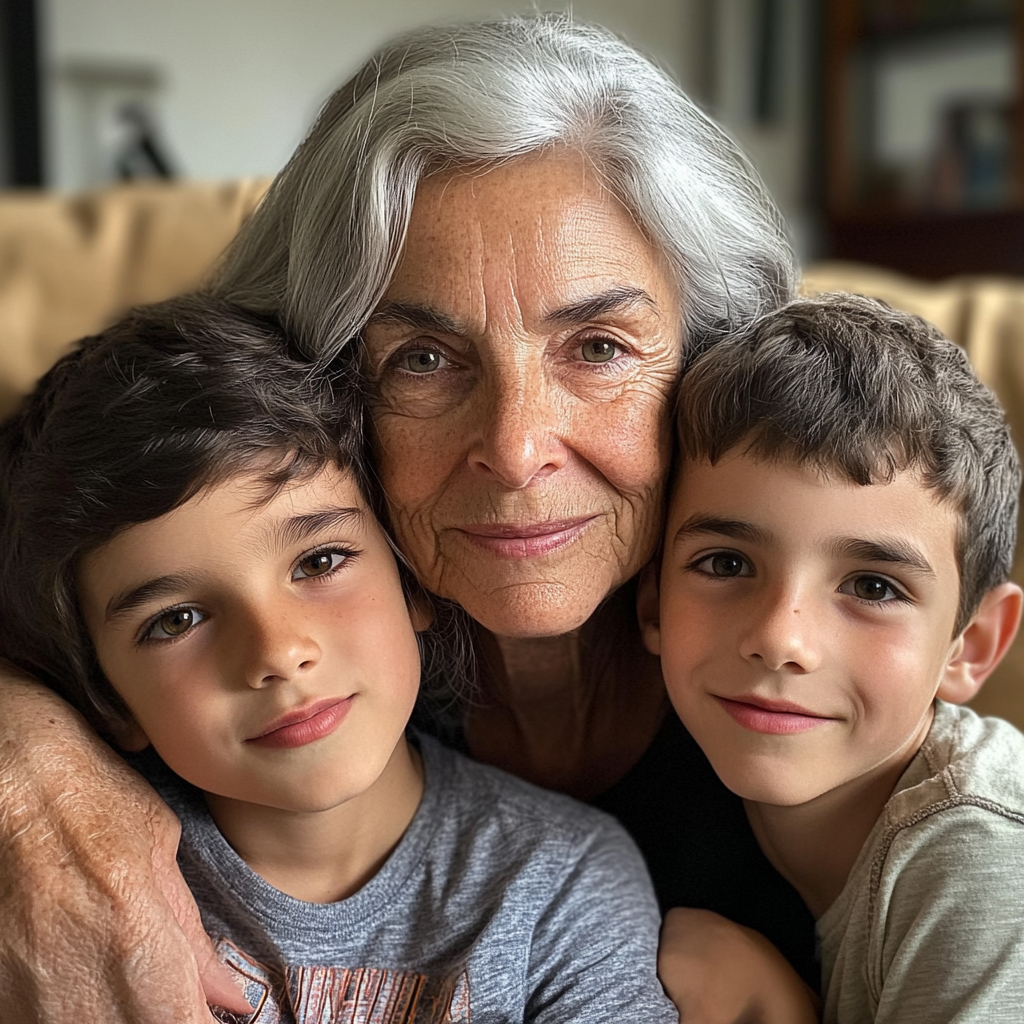
Senior woman with her two twin grandsons | Source: Midjourney
Therapists, doctors, rewards, punishments—nothing worked. The boys remained silent, their once lively voices replaced by a void that felt like a constant shadow over our home.
Eventually, the specialists gave it a name: Temporary Mutism—a condition where a child might stop speaking, often triggered by shocking news or a traumatic event.
Then, last night, everything changed.
I couldn’t take it anymore. I pushed the door open.
As I entered, my twin boys, Jack and Will, sat on their beds, their backs stiff with tension. For a second, all I could do was stare. They had spoken. After months of suffocating silence, I’d heard their voices.
It felt surreal—like I was dreaming, or maybe losing my mind. My heart raced, caught between elation and dread. Elation because the silence was finally broken. Dread because of what I’d overheard.

Twin boys in their room | Source: Midjourney
“What are you two talking about?” I demanded, my voice trembling. The joy of hearing them speak was quickly replaced by unease. Jack flinched his entire body trembling. Will wouldn’t even look at me. They looked so small, so fragile, and yet so guilty.
Jack finally broke the standoff, his voice shaky and uneven. “Mom, we didn’t mean to… it’s not our fault… please forgive us.”
My heart cracked at his words. Forgive them? For what? My mind raced, struggling to understand. “Forgive you? What are you even talking about?”
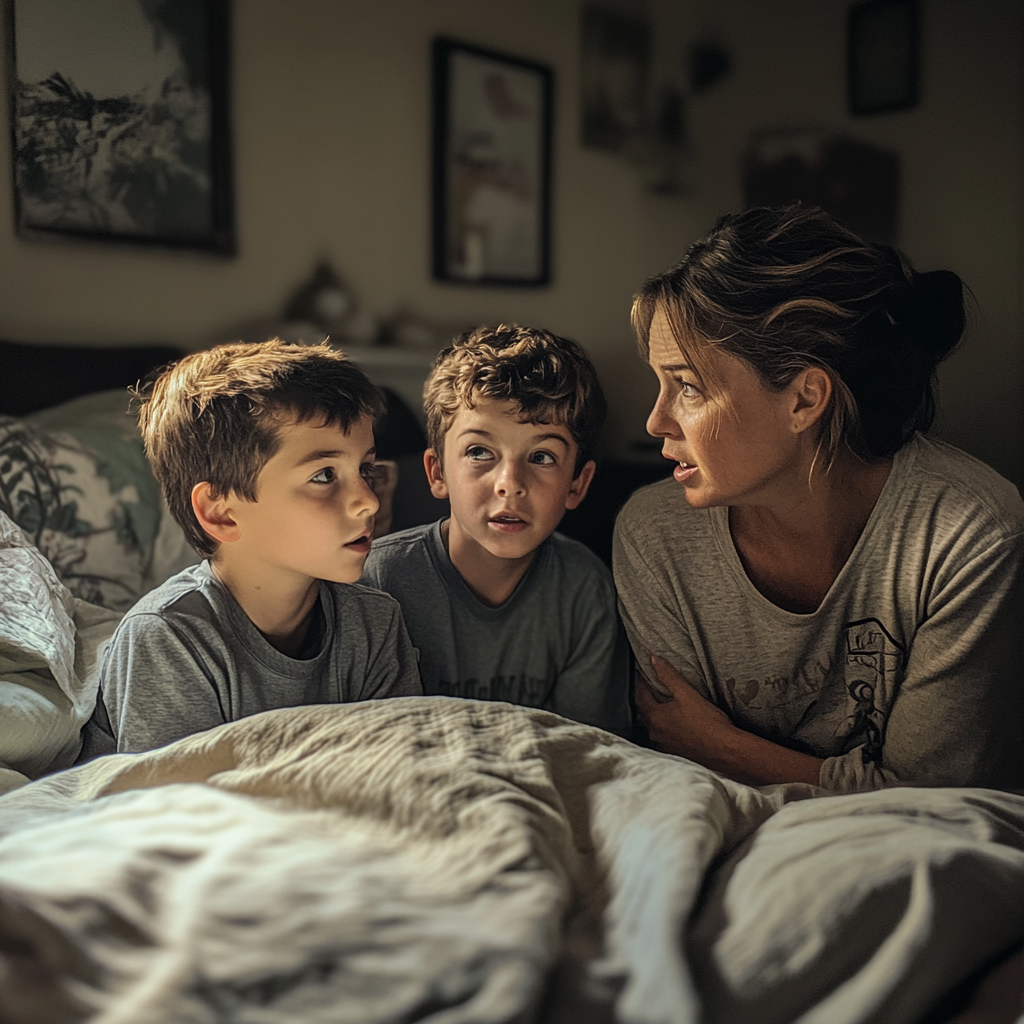
Mother talking to her sons | Source: Midjourney
Jack opened his mouth, then shut it again. He looked over at Will, who bit his lip and a moment later blurted out. “Grandma told us not to tell you… but she said we’re not really your kids.”
The world stopped. Not my kids? The words didn’t make sense. They echoed in my head, sharp and cruel, refusing to sink in.
“What?” I whispered, my voice barely audible. “What are you saying?”
“She said we’re not your kids,” Jack mumbled, his head hanging low. He looked as if he wanted to disappear.
“That’s ridiculous,” I said, louder now. “Of course, you’re my kids. Why would she say something like that? That’s… it’s insane.”
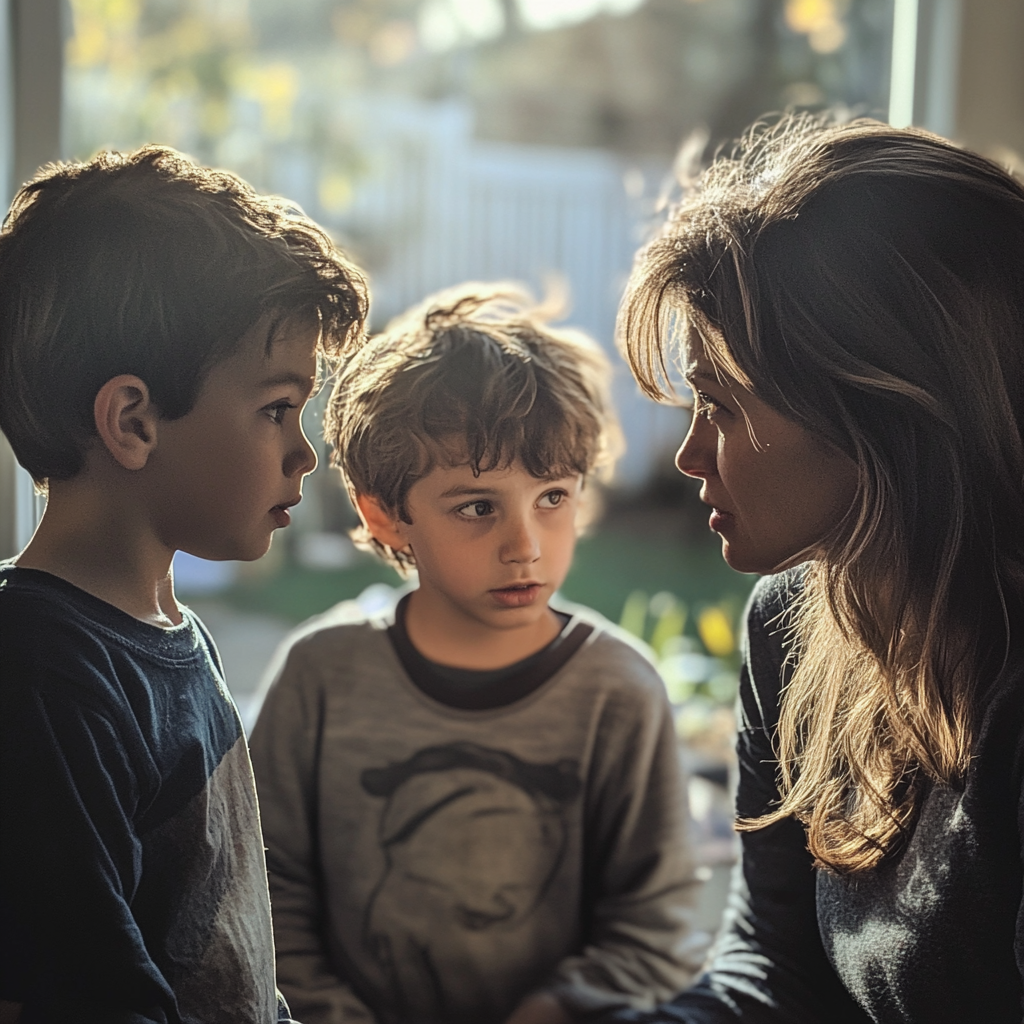
Mother talking to her sons | Source: Midjourney
Jack’s wide, glassy eyes met mine. “I don’t believe it either, Mom,” he said, his voice breaking. “I mean… how could you not be our mom?”
My hands trembled as I knelt in front of them, cupping their faces. “Listen to me. Both of you. This is not true. I don’t care what Grandma said. You are my sons. Always.”
“But… what if she’s right?” Will whispered, his voice cracking.
I shook my head, swallowing back the lump in my throat. “No. We’re not entertaining that thought. I know how to put an end to this.”
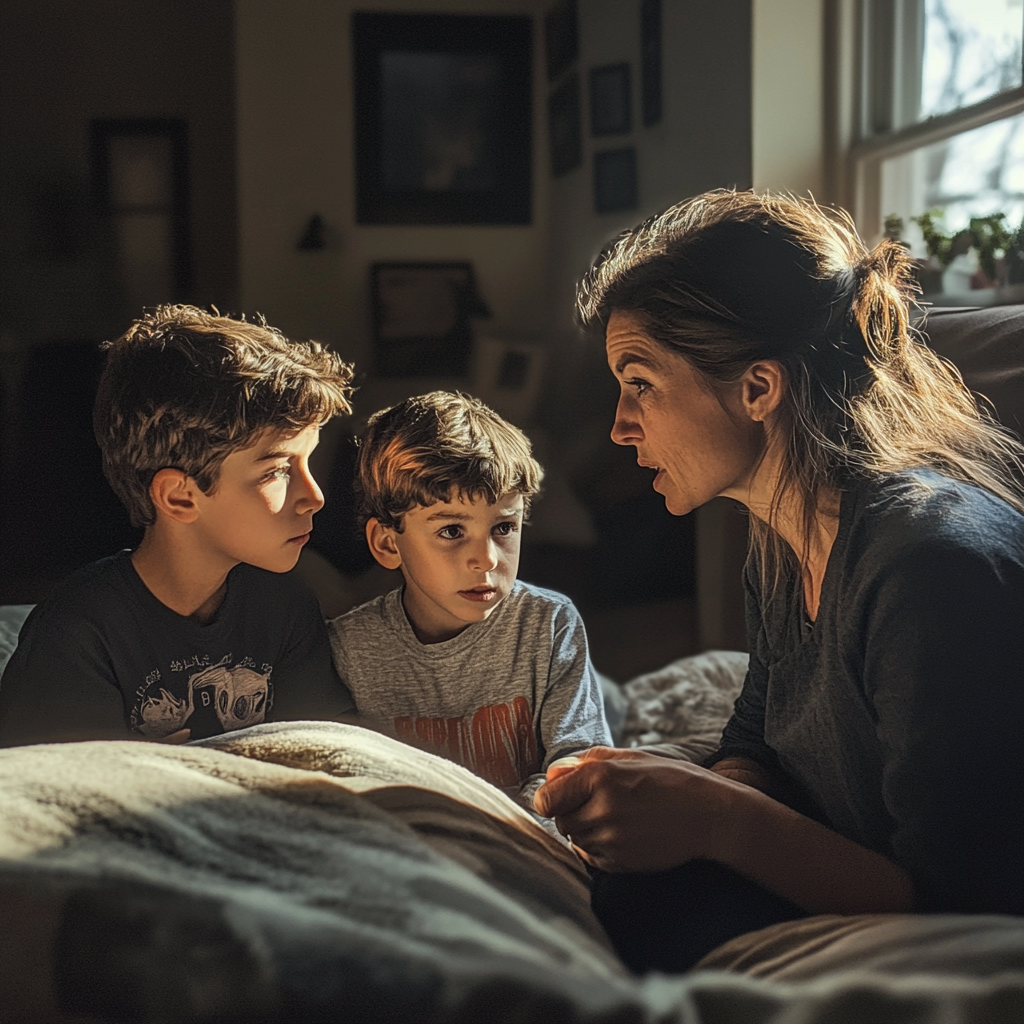
Mother talking to her sons in their room | Source: Midjourney
Jack frowned, confused. “How?”
I stood up, forcing my voice to stay steady. “We’re doing a DNA test. We’re going to settle this once and for all. And when the results come back, we’ll prove her wrong. Okay?”
They nodded reluctantly, but I could still see the doubt lurking in their eyes. Whatever poison Patricia had poured into their ears, it wasn’t just a lie—it was a ticking time bomb. And I wasn’t going to let it tear my family apart.
A week later, the results came in.

A person holding an envelope | Source: Midjourney
I was calm—or at least, I convinced myself I was. The sealed envelope in my hand felt heavier than it should, but I didn’t hesitate. I had no doubts. This was just a formality to dispel the poison Patricia had whispered into my sons’ ears.
But when I tore the envelope open at the kitchen table and read the words, everything stopped.
0% related. No genetic match.
I froze, staring at the results.

Shocked woman staring at DNA results | Source: Midjourney
I reread them, hoping something would change but there it was in cold, clinical letters. Jack and Will weren’t mine. My hands trembled, crushing the paper in my fists. It didn’t make sense. It couldn’t make sense. But it was there, undeniable.
By the time I reached Patricia’s house, my shock had been replaced by fury. I banged on her door so hard my knuckles ached. She answered almost immediately, her expression fading when she saw my face.
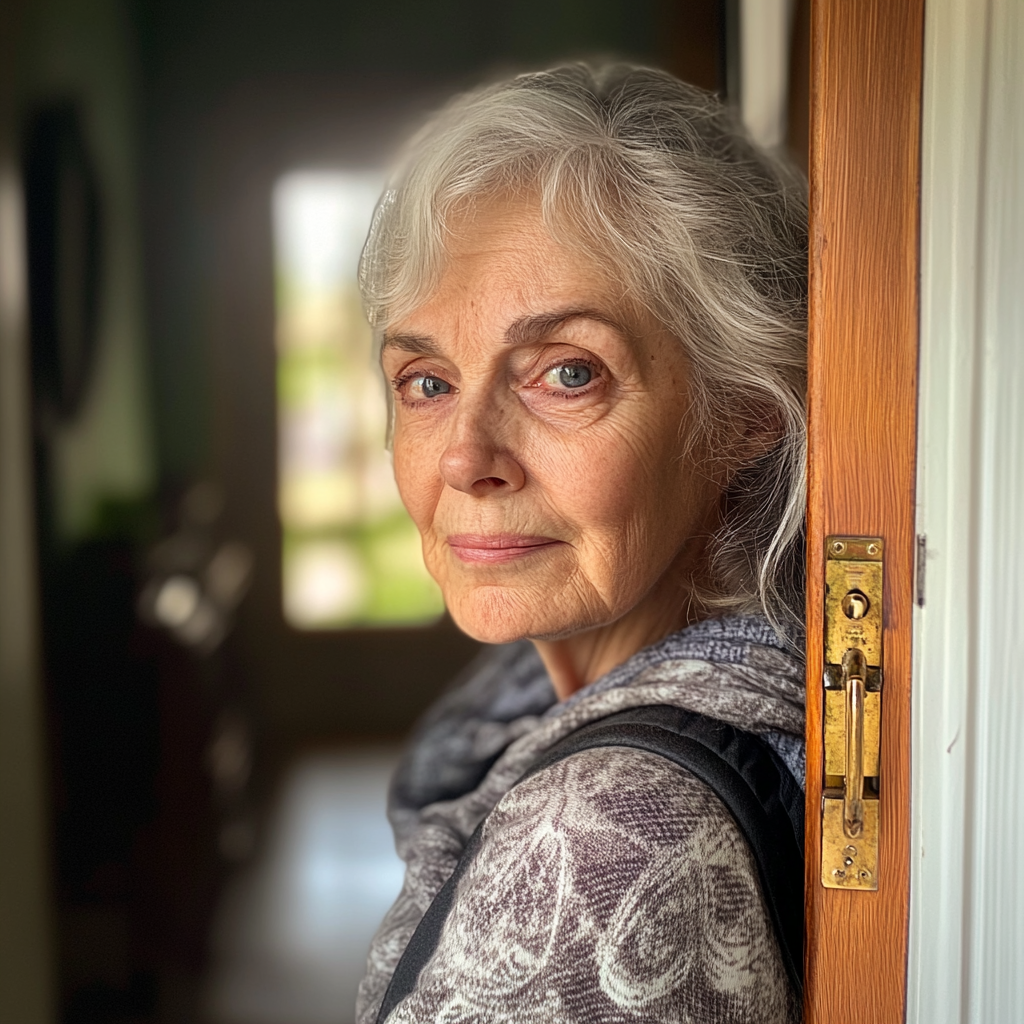
Senior woman standing in her doorway | Source: Getty Images
“You,” I scoffed, shoving the papers into her hands. “You did this. You’ve been poisoning my kids against me, and now this? A DNA test says they’re not mine? Start talking, Patricia. NOW.”
For the first time in years, she looked nervous. “I… I can explain,” she stammered.
“Then explain,” I snapped, my voice breaking. “Because right now, I’m about five seconds from losing it.”
“Sit down,” she said quietly, motioning to the couch. “You need to hear the truth.”
I didn’t sit. I couldn’t. My legs felt too unstable. “Say it,” I demanded, my voice shaking.
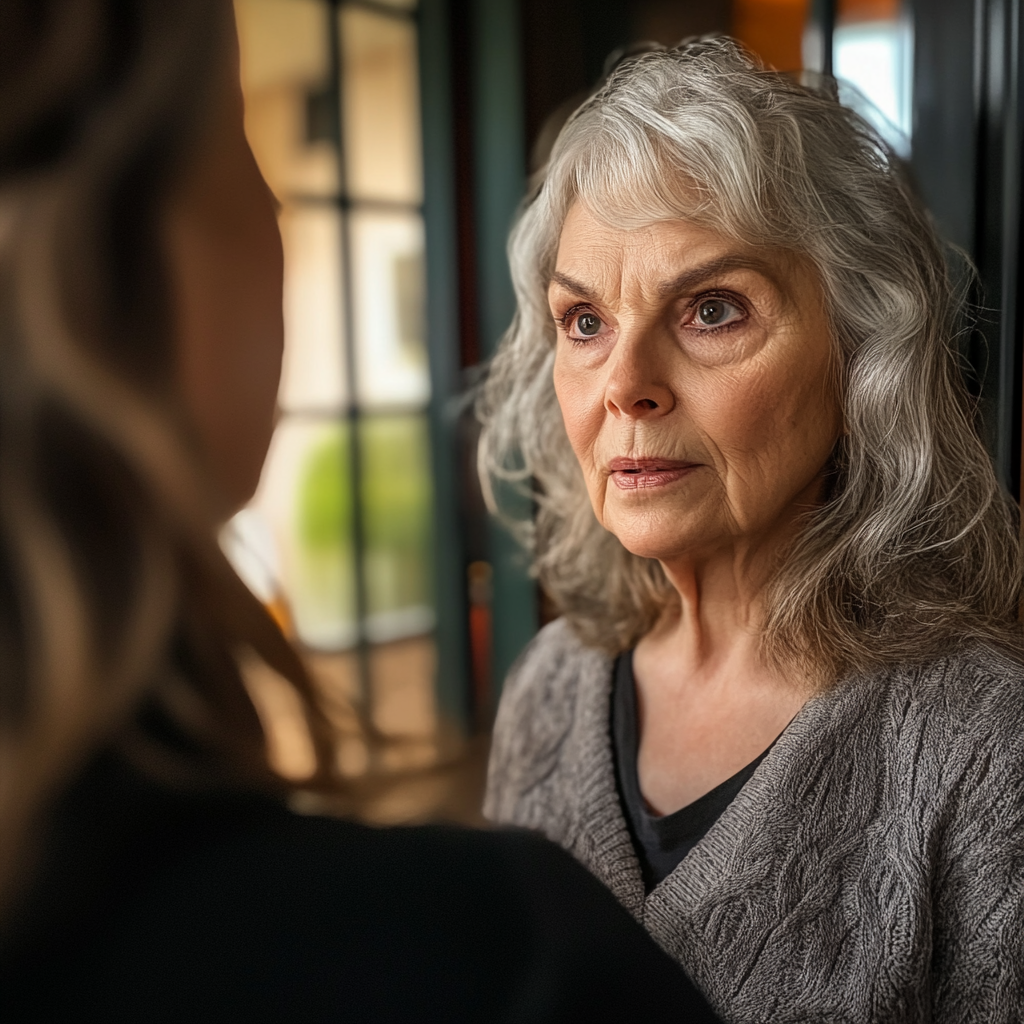
Senior woman confronted by her daughter-in-law | Source: Midjourney
“When you gave birth… there were complications,” she began hesitantly. “You lost a lot of blood. You were unconscious for days. And… the babies didn’t make it.”
I froze. My body went numb. “What?”
“It was Daniel’s idea,” she rushed on. “There was another woman at the hospital. She gave birth to twins but didn’t want to keep them. He thought… we thought… it would be better for you. You wouldn’t survive losing them. Since I knew the surgeon, we made a deal.”
She continued, ” I convinced him to write that Vivian’s twins died while yours were okay and replaced them.”

Newborn twins in the hospital | Source: Midjourney
My breath caught, tears blurring my vision. “You lied to me. You stole them—”
“We saved you,” she cut me off, her voice firm. “You had no idea. You loved them from the start. What difference does it make?”
What difference does it make? Her words slammed into me like a blow, leaving me gasping. Everything—my boys, my life—was built on a lie.
Patricia’s words hung in the air like smoke, choking me. My vision blurred as she continued her story, each word slicing deeper into me.

Woman in deep thoughts | Source: Midjourney
“Their biological mother found out,” Patricia said. “We don’t know how. Maybe the hospital records, maybe someone talked. But she tracked us down. She wanted to meet them—Jack and Will. Daniel and I refused, of course. We thought we could keep her quiet.”
“You thought?” I echoed, my voice barely above a whisper.
Patricia shifted uncomfortably. “She threatened to tell you. She was relentless. Daniel panicked—he thought if you found out, it would destroy you. So we decided to tell the boys instead. We thought they’d understand. That they’d keep quiet until we figured it out.”

Senior woman confronted by her daughter-in-law | Source: Midjourney
“You told them?” My voice cracked, and I was suddenly on my feet, pacing the room. “You told my children—the only children I’ve ever known—that I’m not their mother? That some stranger is?”
“They had to know!” Patricia snapped. “Their biological mother wasn’t going away. She was blackmailing us.”
“And instead of telling me,” I interrupted, my fury spilling over, “you dumped that burden on two ten-year-olds and told them to stay silent?”
Patricia’s eyes hardened. “We didn’t have a choice. We did what was best for you, for them.“

Senior woman talking to her daughter in law | Source: Midjourney
I laughed bitterly, tears streaming down my face. “Best for me? You destroyed them! Do you have any idea what you’ve done?”
The pieces fell into place—the silence, the haunted looks, the cryptic whispers. Jack and Will had been carrying this terrible secret alone. No wonder they’d stopped talking.
At that moment, the front door swung open. Daniel walked in, his face falling as he saw the papers clenched in my hand. “You told her,” he muttered to Patricia.
“No,” I said, my voice steady now. “She didn’t tell me. The DNA test did.“
Daniel froze. For the first time in years, I saw fear in his eyes.
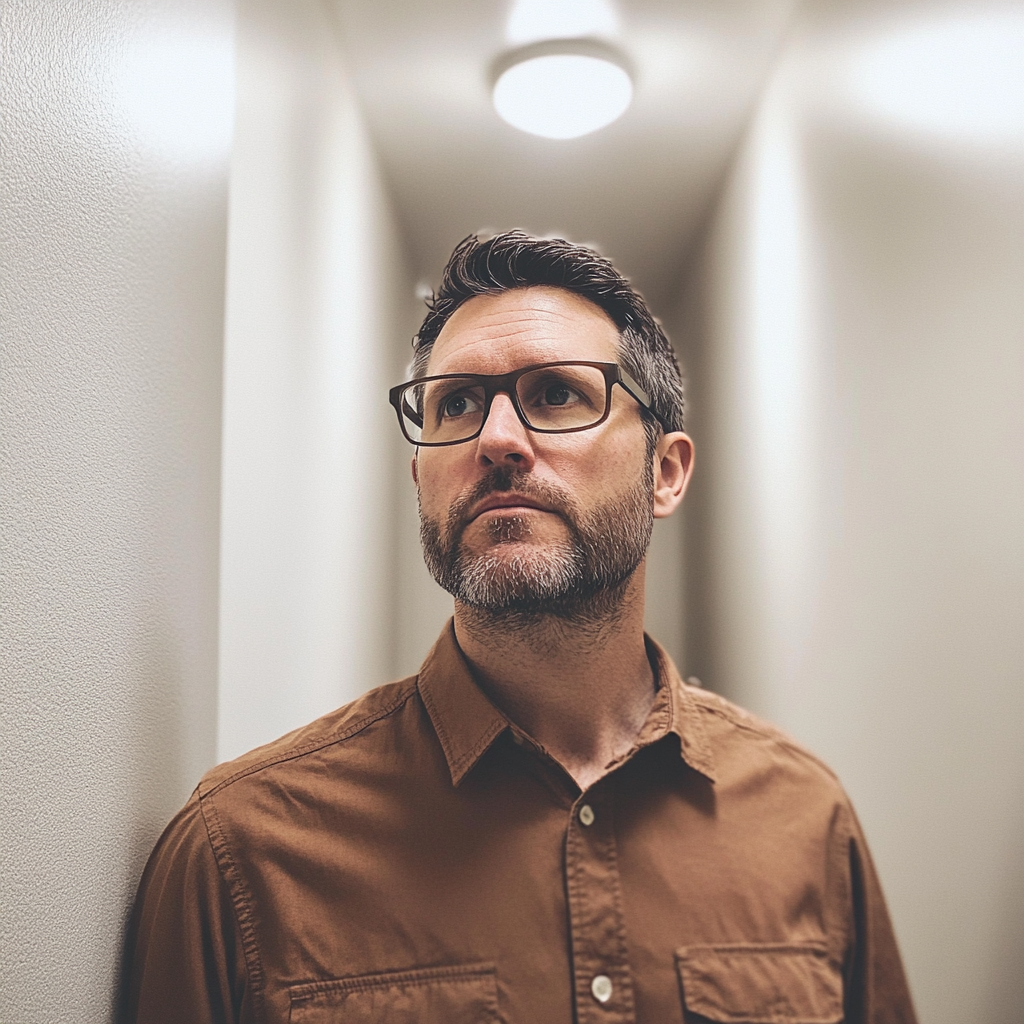
Nervous man standing in the hallway | Source: Midjourney
I stepped closer, my voice trembling with rage. “You both lied to me. You stole my right to grieve, to make my own choices. And now you’ve put my boys through hell. I’ll never forgive you for this.”
Turning to Patricia, I added coldly, “But you’re wrong about one thing. I am their mother. I always have been. And you—both of you—will never come near them again.”
Jack’s voice cut through the silence. “Mom?”
I turned to see him standing in the doorway, tears in his eyes. “We told Grandma we’d never say anything. But… we don’t want to meet her. You’re our mom. That’s all that matters.”
My knees buckled, but I managed to pull him into a hug. “That’s all that’s ever mattered,” I whispered.

Mother hugging her son | Source: Midjourney
If you enjoyed this story, you might like this one too: We adopted a 4-year-old girl – A month later, she told me, ‘mommy, don’t trust daddy.’
This work is inspired by real events and people, but it has been fictionalized for creative purposes. Names, characters, and details have been changed to protect privacy and enhance the narrative. Any resemblance to actual persons, living or dead, or actual events is purely coincidental and not intended by the author.
The author and publisher make no claims to the accuracy of events or the portrayal of characters and are not liable for any misinterpretation. This story is provided as “is,” and any opinions expressed are those of the characters and do not reflect the views of the author or publisher.
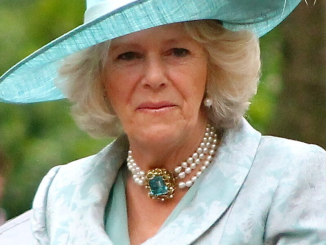


Leave a Reply